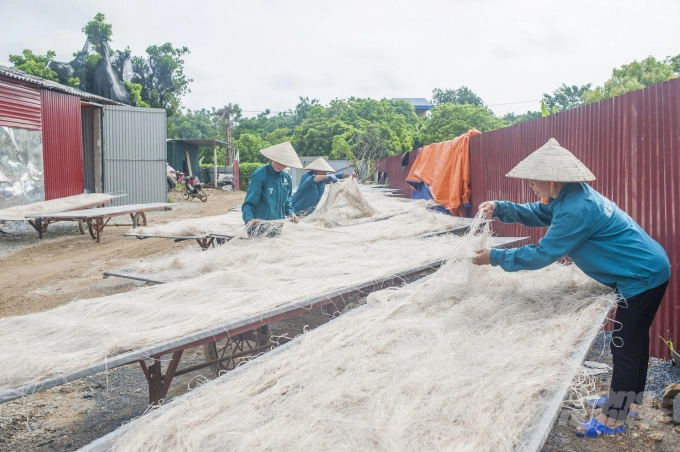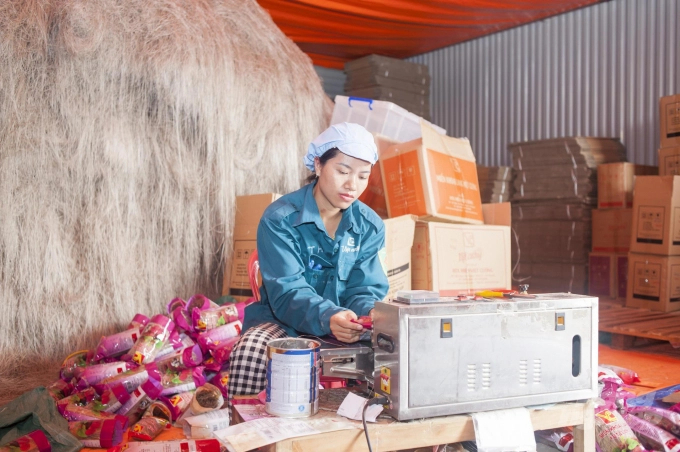November 27, 2025 | 13:21 GMT +7
November 27, 2025 | 13:21 GMT +7
Hotline: 0913.378.918
November 27, 2025 | 13:21 GMT +7
Hotline: 0913.378.918

The adoption of an automatic drying production line will reduce difficulty caused by the weather in making vermicelli. Photo: Dong Van Thuong.
No one in Viet Cuong village knows exactly when the trade of making vermicelli appeared in the village, but it is clear that it has been handed down from generation to generation.Viet Cuong vermicelli is well known for its good texture, fragrant and sweet fibers. Due to its special feature, the vermicelli will not be broken if you cook it and even warm up.
However, the trade faced challenges due to the adoption of out-of-date technology. Their production was absolutely dependent on weather.
In the past, local residents made vermicelli from May until a week before Tet (Lunar New Year). They were quite busy about 1-2 months before the Tet holiday.
The productivity was low as all production steps were done manually. Many people didn’t want to engage in the traditional profession of their ancestors and switch to other jobs because of low income.
Fearing that the craft might be lost, Nguyen Van Bao, a local resident, determined to revive the tradition.
Bao quit studying after he finished seventh grade because his parents were very poor. He did some odd jobs to support the family’s income.
He said he didn’t sleep well for many nights, wondering about finding a new direction for making vermicelli.
After getting experience from his parents, Bao went to Bac Kan to purchase ingredients.
Then, he failed at the first attempt. Hundreds kilogrammes of vermicelli have been thrown away due to rainy weather.
However, the failure did not discourage him.
In 2007, Bao set up Viet Cuong vermicelli Cooperative with a desire to provide products with prestige and clear origin to the market.
Initially, the cooperative only had 9 members.
Ba said he encountered many difficulties at the beginning but he gradually overcame them.
“Seeing a potential development for a safe vermicelli market, I have manufactured a vermicelli press machine and an automatic drying production line to reduce labour cost. As a result, labour productivity has increased remarkably,” he said.
He also invested capital in installation of a modern production line imported from foreign countries. Thanks to the application of this line, the cooperative is producing about two tonnes of vermicelli per day, gradually meeting the customers’ demand.
The vermicelli is packed right after they finish production, so it is not affected by the weather.

Packaging finished vermicelli at Viet Cuong Vermicelli Cooperative. Photo: Dong Van Thuong.
Currently, the cooperative has 3 main products - arrowroot vermicelli, sweet potato vermicelli and cassava vermicelli. Of these, two products have qualified for One Commune One Products Standards.
In 2019, the cooperative earned VND5 billion ($215,000) in revenue.
It now has 25 members with a monthly salary of VND6 million (US$258) per person.
With his contribution in agricultural techniques, in 2012, Bao was awarded Luong Dinh Cua Prize – the award given to young farmers with outstanding achievements in manufacturing, trade, applying modern science technologies, protecting the environment and setting up new rural lifestyles.
Viet Cuong vermicelli is among those recognised as national outstanding rural industrial products.
The vermicelli made by Ba's cooperative are on sale in big supermarkets and provinces across the country.
The cooperative is expanding the production so that its products will be sold not only to the domestic market but also exported to overseas ones, he said.
Author: Dong Van Thuong. Translated by Minh Quang. Edited by Duc Huy.

(VAN) China’s cooking oil is suddenly flooding into India. It all comes down to a soybean surplus that Beijing doesn’t quite know what to do with.

(VAN) An Giang promotes supply-demand connections, standardizes quality and builds value chains, creating a foundation for sustainable bird’s nest development and aiming to expand exports.
/2025/11/24/5339-4-nongnghiep-075331.jpg)
(VAN) Recently, the conference on 'Sustainable Fisheries Linkage Chain - Tilapia for Export' took place in Tien Hai commune, Hung Yen province.
/2025/11/21/4309-2-153400_128.jpg)
(VAN) Green and low-emission rice is paving the way for Vietnamese rice to enter high-end markets, marking the beginning of a transformation journey toward greening and elevating the national rice brand.

(VAN) ‘Right to Win’ outlines a national action plan that shapes a new vision for Viet Nam’s agriculture in an era of renewal and global integration.

(VAN) Lam Dong’s farmed sturgeon output this year is expected to reach 2,300 tons, worth VND 450 billion, affirming the brand’s position on the market.

(VAN) A surge in Ukrainian egg exports, largely driven by soaring sales to the UK over the last few years, has notably pushed up egg prices on the domestic market.